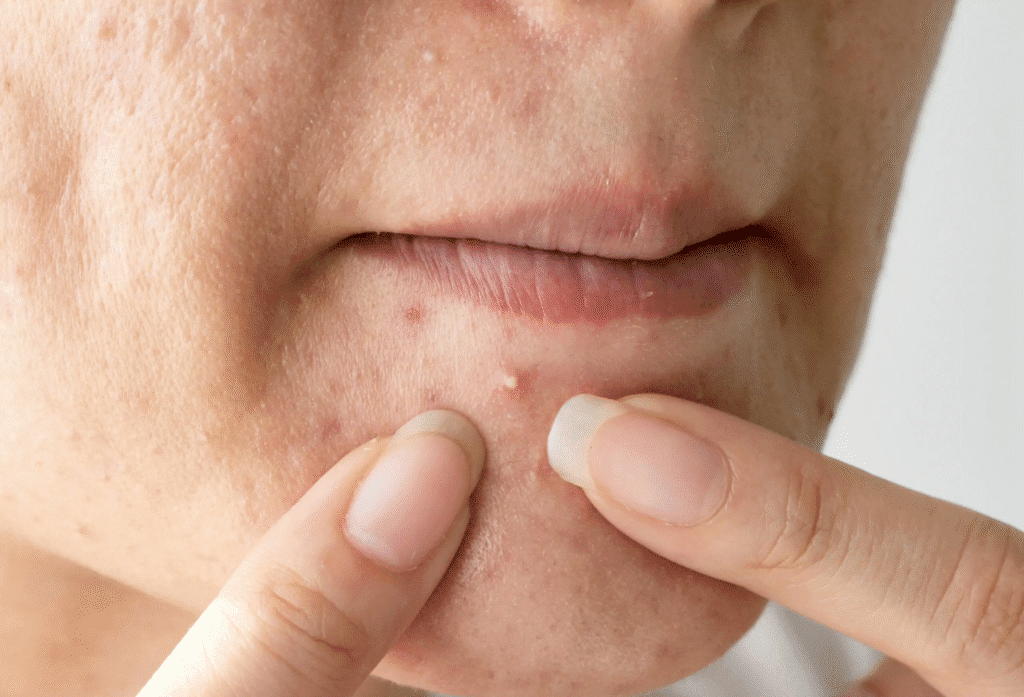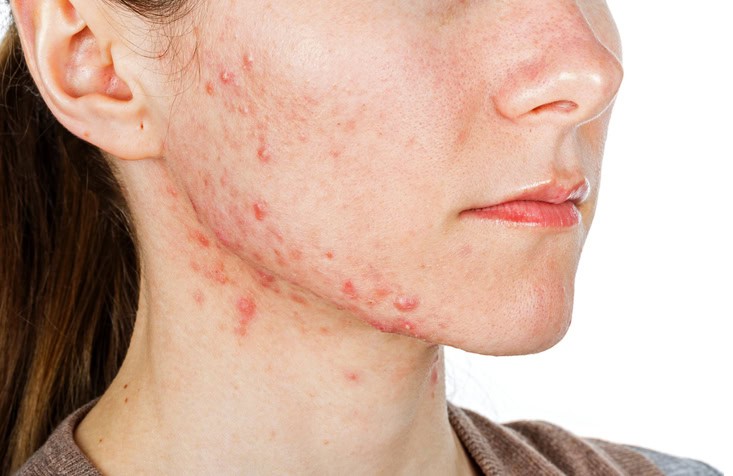Another sore, infuriated pimple has popped up along my jawline, among a group of nine or ten others. Their presence is now a constant staple in my life, accompanied by blackheads, cloggy pores, and oily buildup. At the age of 33, I believed I was done with hormonal acne. Like popstar posters on my bedroom wall and home highlights, I believed I’d left spotty skin in my teens. Sadly, as I have aged, my skin has only deteriorated.
I’ve been fortunate to calm my skin with the contraceptive pill, yet if I ever go birth-control-free, my skin spirals out of control. As health issues come, hormonal acne is not a terribly crippling one. Nevertheless, it tends to make me self-conscious enough to avoid leaving the house without a full face of makeup. Social media doesn’t help, certainly. It’s difficult to log onto Instagram or TikTok and encounter anything besides impossibly clear, radiant complexions. This is particularly tough when your skin looks anything but. So, why do “teenage” skin issues continue into adulthood, and — importantly — how can you stop it? Keep reading to discover.
What Is Hormonal Acne?

Hormonal acne is breakouts that are related to changes in your hormones, usually during puberty.
That said, hormonal breakouts can occur well into adulthood, and it’s most prevalent in women.
Approximately 50% of women aged 20–29 and 25% of women aged 40–49 have acne, based on a 2008 study.
Typically, hormonal acne is marked by:
- Cheek and jawline acne
- Blackheads, whiteheads, or cysts
- Oily skin
- Inflammation
- Sensitivity
What Causes Hormonal Acne?
Most breakouts occur when the oil glands of the skin are more sensitive to a range of hormones called androgens, says Dr. Natalia Spierings, consultant dermatologist and author of Skintelligent.
Androgens make oil glands bigger and produce more oil. Although everyone makes androgens, sensitivity and hormone levels differ among individuals and age groups.
Lifestyle habits also make breakouts worse, particularly the excessive use of skin care products, which make the skin inflamed and irritated.
Why Do Adults Get Hormonal Acne?
Adult hormonal acne, particularly in women, often results from:
- Hormonal shifts in premenstruation
- Dietary less than ideal
- Lack of sleep
- Excessive makeup wear
- Stress
Can You Get Hormonal Skin at Any Age?
Yes. There is no age at which hormonal acne starts and stops, unfortunately.
“Every woman is different. Some never develop acne, and some have it well into menopause.” – Dr. Spierings
If you had acne-prone, oily skin in your 20s or 30s, breakouts can continue even in your older years.
Managing Hormonal Skin

1. Pare Back Your Skin Care Routine
Keep it simple. Overproducting your skin can irritate it.
Keep it basic: cleanser, moisturizer, and sunscreen.
2. Try One Treatment at a Time
Don’t layer multiple treatments for acne.
Dr. Spierings recommends beginning with:
- Salicylic acid (2%)
- Benzoyl peroxide
- Adapalene (Differin Gel)
- Azelaic acid
- Beta hydroxy acid (BHA)
Try each for a few weeks to gauge results.
3. See a Dermatologist
If hormonal acne is compromising your mental well-being or your self-esteem, see a professional. A dermatologist can individualize treatment and provide access to more potent medications if necessary.
4. Try Hormonal Birth Control
For others, oral contraceptives can normalize hormonal changes and improve acne. However, it’s a good idea to speak with a doctor beforehand, particularly since progesterone-only pills might exacerbate acne for some individuals.
Diet, stress reduction, good sleep, and proper cleansing might work. However, recalcitrant hormonal acne usually needs medical therapies such as topical retinoids or oral spironolactone.
Learning to Accept Hormonal Skin
Accepting can be freeing when long-term fixes are not forthcoming.
Anupa Roper, a body image educator, suggests:
- Letting go of the pressure for perfect skin
- Following social accounts that represent real, unfiltered skin
- Embracing what you do love about you—whether that’s freckles, your smile, or your hair
Takeaway
Hormonal acne can last well into your 30s, 40s, and beyond—but you’re not alone.
No matter how you keep it in check, whether through treatment, lifestyle adjustments, or self-acceptance, recognize that clear, radiant skin is not the sole measure of beauty.
Also Read : Best Ingredients for Anti-Aging Skincare: What Really Works



